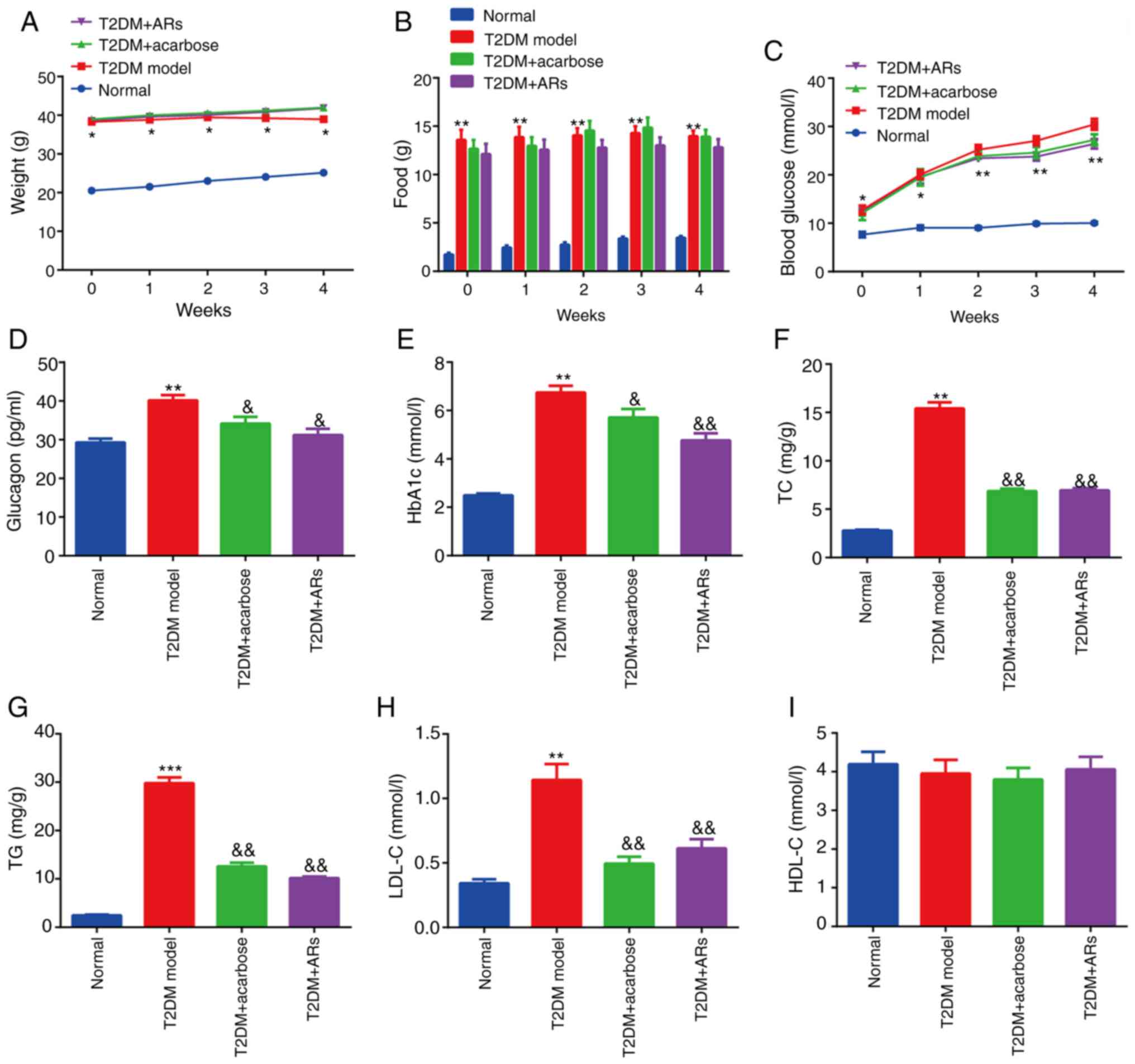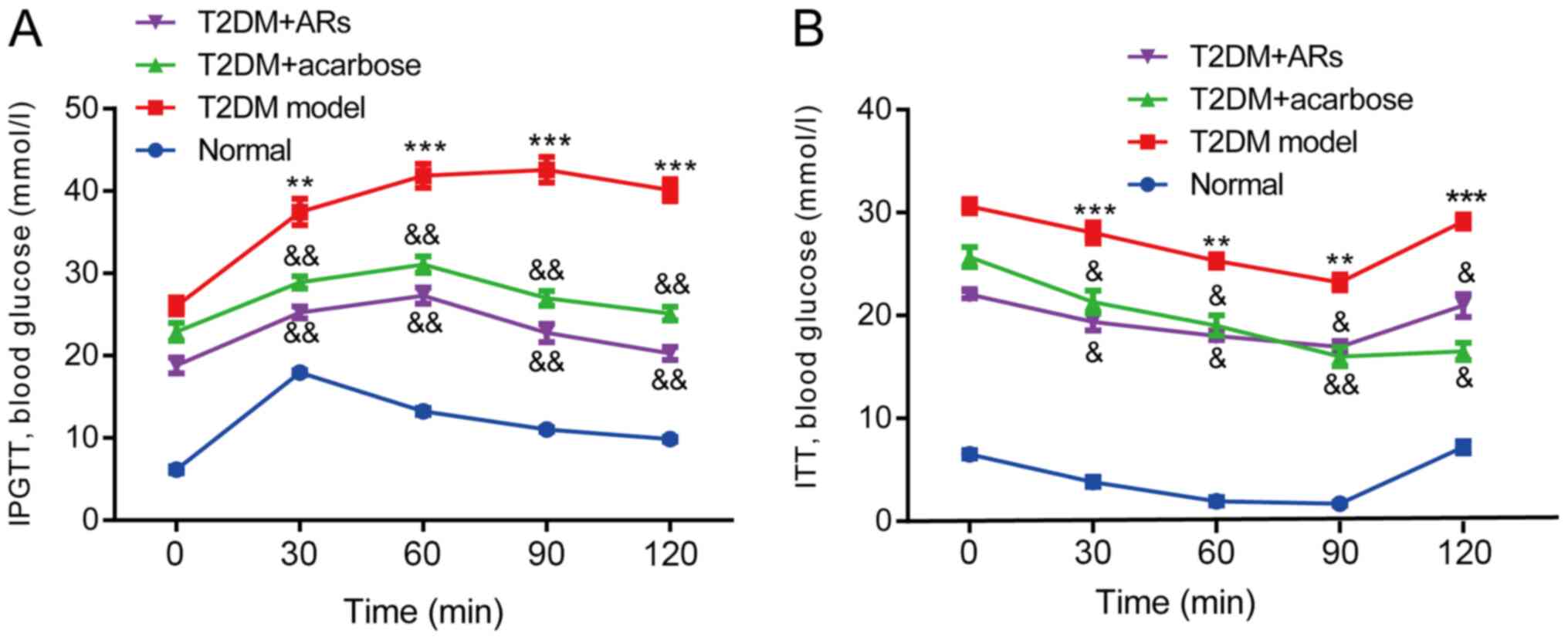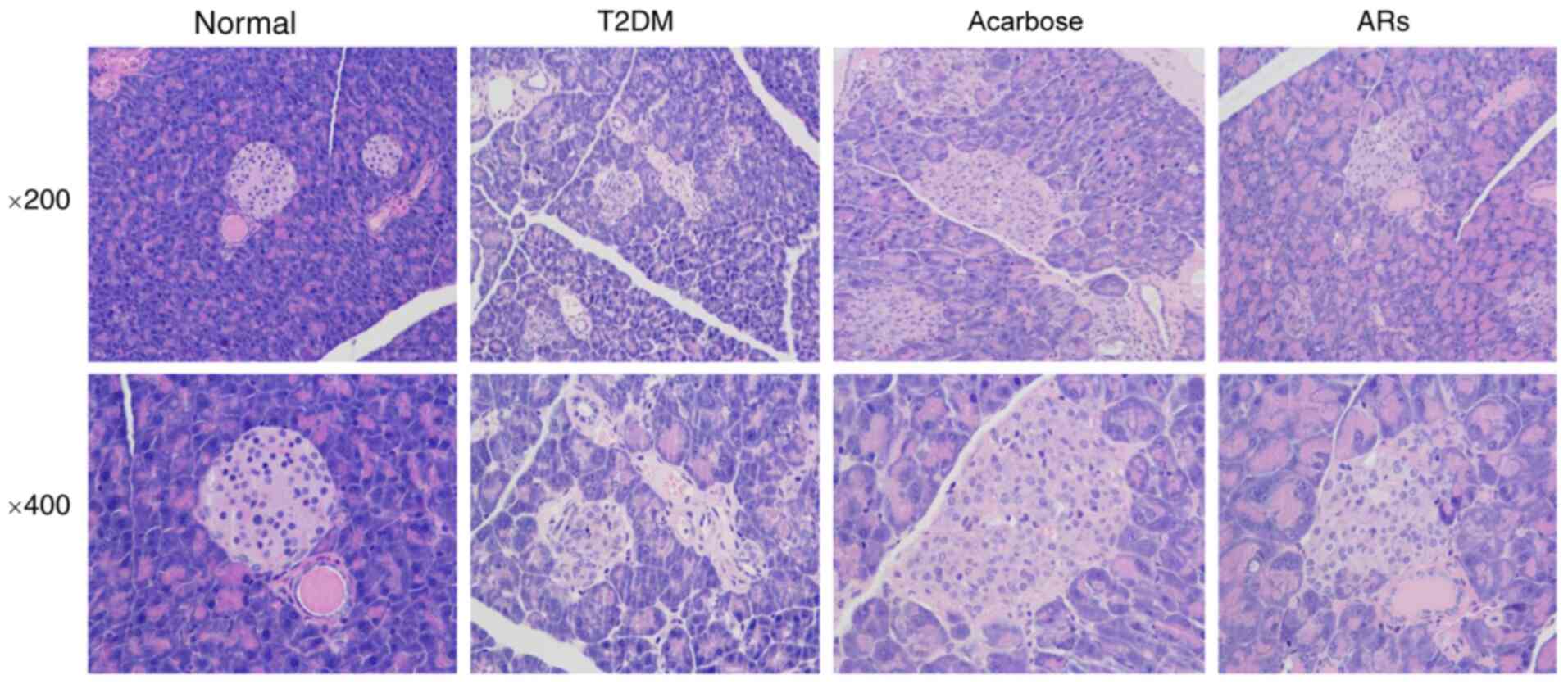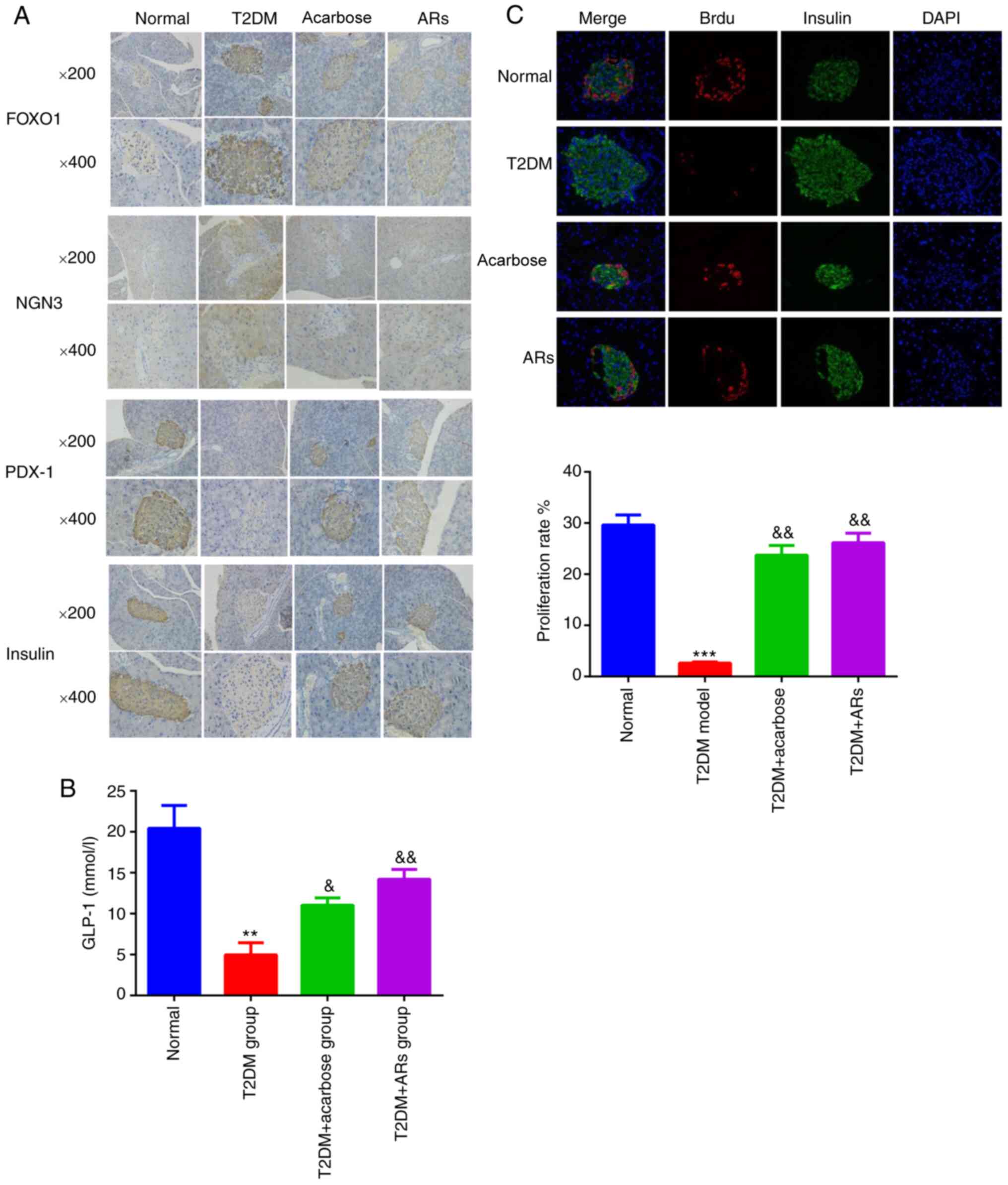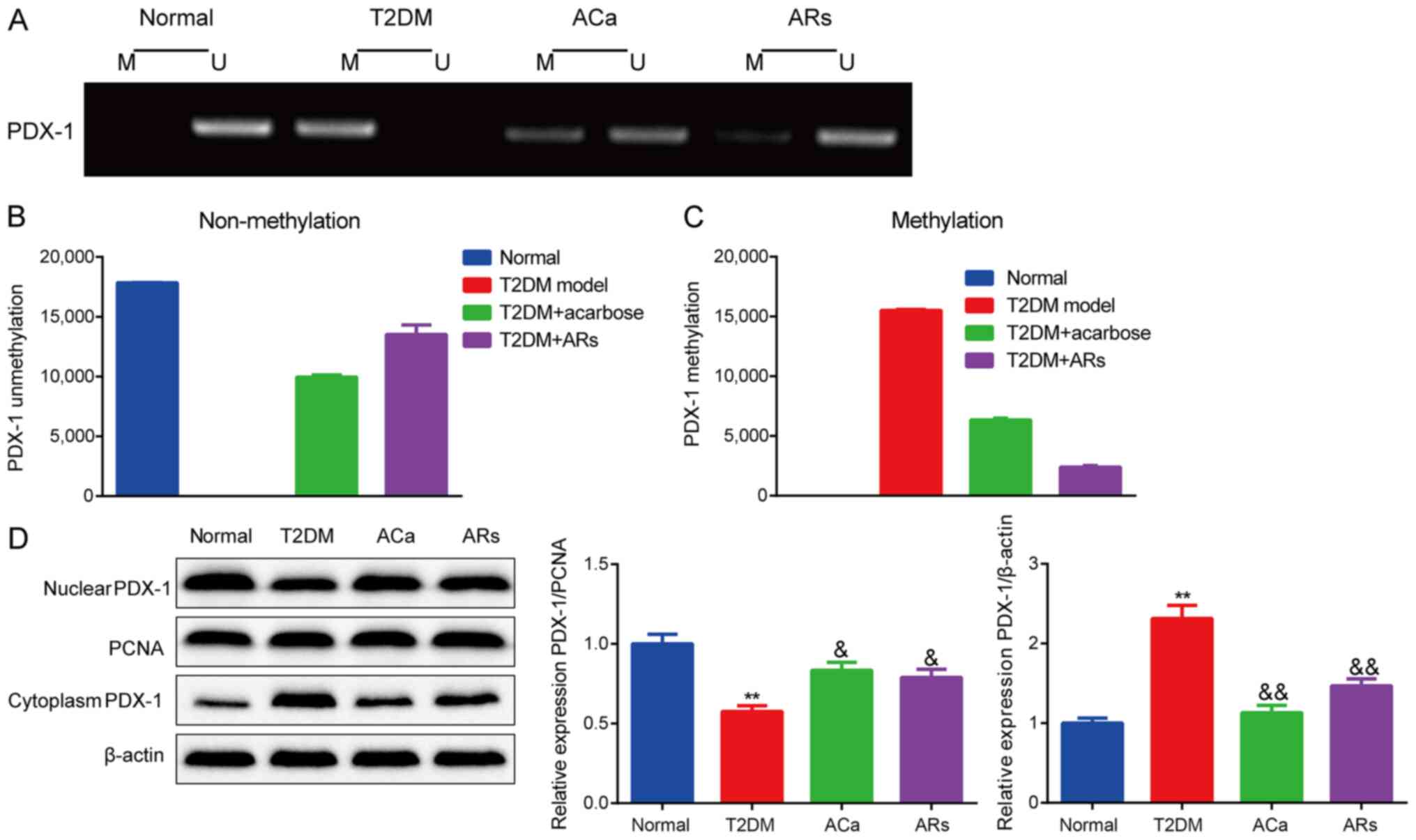|
1
|
Sharma AK, Bharti S, Goyal S, Arora S,
Nepal S, Kishore K, Joshi S, Kumari S and Arya DS: Upregulation of
PPARγ by Aegle marmelos ameliorates insulin resistance and β-cell
dysfunction in high fat diet fed-streptozotocin induced type 2
diabetic rats. Phytother Res. 25:1457–1465. 2011. View Article : Google Scholar : PubMed/NCBI
|
|
2
|
Orchard TJ, Olson JC, Erbey JR, Williams
K, Forrest KY, Smithline Kinder L, Ellis D and Becker DJ: Insulin
resistance-related factors, but not glycemia, predict coronary
artery disease in type 1 diabetes: 10-year follow-up data from the
Pittsburgh epidemiology of diabetes complications study. Diabetes
Care. 26:1374–1379. 2003. View Article : Google Scholar : PubMed/NCBI
|
|
3
|
Regazzi R: MicroRNAs as therapeutic
targets for the treatment of diabetes mellitus and its
complications. Expert Opin Ther Targets. 22:153–160. 2018.
View Article : Google Scholar : PubMed/NCBI
|
|
4
|
Oza MJ and Kulkarni YA: Biochanin A
improves insulin sensitivity and controls hyperglycemia in type 2
diabetes. Biomed Pharmacother. 107:1119–1127. 2018. View Article : Google Scholar : PubMed/NCBI
|
|
5
|
Wing RR, Rosen RC, Fava JL, Bahnson J,
Brancati F, Gendrano Iii IN, Kitabchi A, Schneider SH and Wadden
TA: Effects of weight loss intervention on erectile function in
older men with type 2 diabetes in the Look AHEAD trial. J Sex Med.
7:156–165. 2010. View Article : Google Scholar : PubMed/NCBI
|
|
6
|
Zhou Z, Sun B, Li X and Zhu C: DNA
methylation landscapes in the pathogenesis of type 2 diabetes
mellitus. Nutr Metab (Lond). 15:472018. View Article : Google Scholar : PubMed/NCBI
|
|
7
|
Sharma S and Taliyan R: Histone
deacetylase inhibitors: Future therapeutics for insulin resistance
and type 2 diabetes. Pharmacol Res. 113:320–326. 2016. View Article : Google Scholar : PubMed/NCBI
|
|
8
|
Malipatil N, Lunt M, Narayanan RP, Siddals
K, Cortés Moreno GY, Gibson MJ, Gu HF, Heald AH and Donn RP:
Assessment of global long interspersed nucleotide element-1
(LINE-1) DNA methylation in a longitudinal cohort of type 2
diabetes mellitus (T2DM) individuals. Int J Clin Pract. e13270Oct
21–2018.(Epub ahead of print). PubMed/NCBI
|
|
9
|
Hudec M, Dankova P, Solc R, Bettazova N
and Cerna M: Epigenetic regulation of circadian rhythm and its
possible role in diabetes mellitus. Int J Mol Sci. 21:30052020.
View Article : Google Scholar
|
|
10
|
Paneni F, Costantino S, Volpe M, Lüscher
TF and Cosentino F: Epigenetic signatures and vascular risk in type
2 diabetes: A clinical perspective. Atherosclerosis. 230:191–197.
2013. View Article : Google Scholar : PubMed/NCBI
|
|
11
|
Pedica F, Beccari S, Pedron S, Montagna L,
Piccoli P, Doglioni C and Chilosi M: PDX-1 (pancreatic/duodenal
homeobox-1 protein 1). Pathologica. 106:315–321. 2014.PubMed/NCBI
|
|
12
|
Zhou G, Yu J, Wang A, Liu SH,
Sinnett-Smith J, Wu J, Sanchez R, Nemunaitis J, Ricordi C,
Rozengurt E and Brunicardi FC: Metformin restrains pancreatic
duodenal homeobox-1 (PDX-1) function by inhibiting ERK signaling in
pancreatic ductal adenocarcinoma. Curr Mol Med. 16:83–90. 2016.
View Article : Google Scholar : PubMed/NCBI
|
|
13
|
Rafati R, Jalal R, Asoodeh A and Matin MM:
Association of rs12255372 (TCF7L2) and D76N (PDX-1) polymorphisms
with type 2 diabetes in a population living in Northeast Iran. Arch
Iran Med. 18:376–378. 2015.PubMed/NCBI
|
|
14
|
Kaneto H, Matsuoka TA, Kimura T, Obata A,
Shimoda M, Kamei S, Mune T and Kaku K: Appropriate therapy for type
2 diabetes mellitus in view of pancreatic β-cell glucose toxicity:
‘The earlier, the better’. J Diabetes. 8:183–189. 2016. View Article : Google Scholar : PubMed/NCBI
|
|
15
|
McIver LA and Tripp J: Acarbose.
StatPearls. StatPearls Publishing Copyright © 2020. StatPearls
Publishing LLC.; Treasure Island (FL): 2020, simplehttps://www.ncbi.nlm.nih.gov/books/NBK493214Aughust
10–2020
|
|
16
|
Tu J, Liu G, Cao X, Zhu S, Li Q, Ji G, Han
Y and Xiao H: Hypoglycemic effects of wheat bran alkyresorcinols in
high-fat/high-sucrose diet and low-dose streptozotocin-induced type
2 diabetic male mice and protection of pancreatic β cells. Food
Funct. 10:3282–3290. 2019. View Article : Google Scholar : PubMed/NCBI
|
|
17
|
Triplitt C, Cersosimo E and DeFronzo RA:
Pioglitazone and alogliptin combination therapy in type 2 diabetes:
A pathophysiologically sound treatment. Vasc Health Risk Manag.
6:671–690. 2010.PubMed/NCBI
|
|
18
|
Li FF, Xu XH, Fu LY, Su XF, Wu JD, Lu CF,
Ye L and Ma JH: Influence of acarbose on plasma glucose
fluctuations in insulin-treated patients with type 2 diabetes: A
pilot study. Int J Endocrinol. 2015:9035242015. View Article : Google Scholar : PubMed/NCBI
|
|
19
|
Butler AE, Janson J, Bonner-Weir S, Ritzel
R, Rizza RA and Butler PC: Beta-cell deficit and increased
beta-cell apoptosis in humans with type 2 diabetes. Diabetes.
52:102–110. 2003. View Article : Google Scholar : PubMed/NCBI
|
|
20
|
Wang X, Zhou L, Li G, Luo T, Gu Y, Qian L,
Fu X, Li F, Li J and Luo M: Palmitate activates AMP-activated
protein kinase and regulates insulin secretion from beta cells.
Biochem Biophys Res Commun. 352:463–468. 2007. View Article : Google Scholar : PubMed/NCBI
|
|
21
|
Shao S, Fang Z, Yu X and Zhang M:
Transcription factors involved in glucose-stimulated insulin
secretion of pancreatic beta cells. Biochem Biophys Res Commun.
384:401–404. 2009. View Article : Google Scholar : PubMed/NCBI
|
|
22
|
Brissova M, Shiota M, Nicholson WE, Gannon
M, Knobel SM, Piston DW, Wright CV and Powers AC: Reduction in
pancreatic transcription factor PDX-1 impairs glucose-stimulated
insulin secretion. J Biol Chem. 277:11225–11232. 2002. View Article : Google Scholar : PubMed/NCBI
|
|
23
|
Kitamura T, Nakae J, Kitamura Y, Kido Y,
Biggs WH III, Wright CV, White MF, Arden KC and Accili D: The
forkhead transcription factor Foxo1 links insulin signaling to Pdx1
regulation of pancreatic beta cell growth. J Clin Invest.
110:1839–1847. 2002. View Article : Google Scholar : PubMed/NCBI
|
|
24
|
Zhu Y, Liu Q, Zhou Z and Ikeda Y: PDX1,
neurogenin-3, and MAFA: Critical transcription regulators for beta
cell development and regeneration. Stem Cell Res Ther. 8:2402017.
View Article : Google Scholar : PubMed/NCBI
|
|
25
|
Van de Casteele M, Leuckx G, Baeyens L,
Cai Y, Yuchi Y, Coppens V, De Groef S, Eriksson M, Svensson C,
Ahlgren U, et al: Neurogenin 3+ cells contribute to β-cell
neogenesis and proliferation in injured adult mouse pancreas. Cell
Death Dis. 4:e5232013. View Article : Google Scholar : PubMed/NCBI
|















